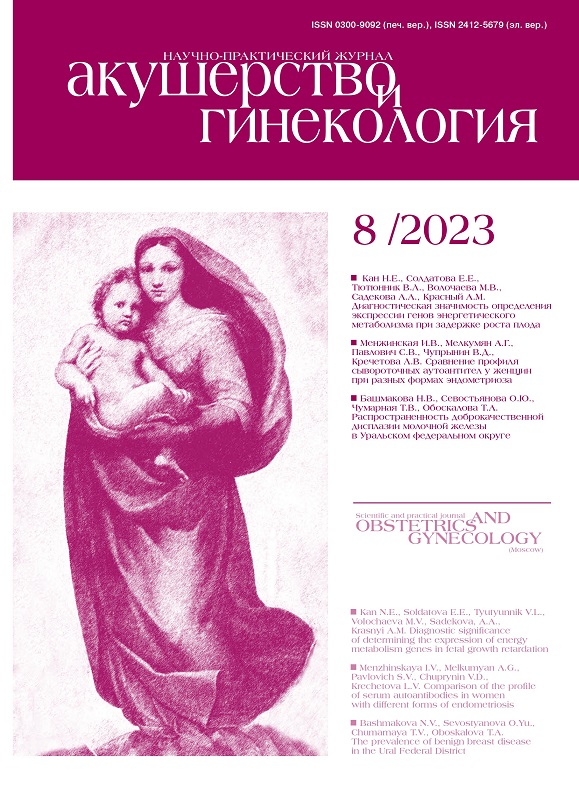The management of childbirth and the postpartum period in a patient with acute intermittent porphyria, an anesthesiologist/resuscitator’s tactics
- Authors: Еlizarova E.S.1, Parfenova O.A.1, Filippovich G.V.1, Pyregov A.V.1
-
Affiliations:
- Academician V.I. Kulakov National Medical Research Center of Obstetrics, Gynecology, and Perinatology, Ministry of Health of the Russian Federation
- Issue: No 8 (2023)
- Pages: 212-215
- Section: Clinical Notes
- Published: 22.09.2023
- URL: https://journals.eco-vector.com/0300-9092/article/view/595700
- DOI: https://doi.org/10.18565/aig.2022.324
- ID: 595700
Cite item
Abstract
Background: Acute intermittent porphyria is a group of rare hereditary metabolic diseases caused by a genetic defect of the enzymes involved in heme biosynthesis that leads to the excessive accumulation of porphyrins in the body. Surgical intervention and the use of various medications can result in an exacerbation of acute intermittent porphyria.
Case report: The paper describes a clinical case of a 25-year-old patient diagnosed as having 38 week’s gestation, acute intermittent porphyria, a condition after two heme arginate therapy cycles started in 2019, and clinical hematological compensation, porphyritic polyneuropathy, Stage 2 chronic kidney disease. The patient was admitted in a satisfactory condition to the V.I. Kulakov National Medical Research Center of Obstetrics, Gynecology, and Perinatology, after a telemedical consultation to be examined and prepared for surgical delivery. There was no clinically significant polyneuropathy, neurological deficit, and autonomic nervous system dysfunction during pregnancy. Three days before the date of delivery, infusion preparation was done using a 20% glucose solution of 1000 ml per day, daily serum sodium monitoring, single determination of the urinary porphyrinogen level (69 mg/l). General balanced anesthesia was the method of choice. The postoperative period occurred without respiratory and hemodynamic disorders. The investigators monitored the levels of serum sodium and iron, blood inflammation markers, creatinine, ferritin, and urea. The administration of heme arginate was not required due to her good preoperative preparation. At 24 hours after surgery, the patient was transferred to the specialized unit. She was discharged in a satisfactory condition on 7 postoperative days.
Conclusion: The described case demonstrates that there can be a favorable course of pregnancy, childbirth and the postpartum period in porphyria compensation, optimal choice of a method for delivery and anesthesia, adequate preoperative preparation.
Full Text
About the authors
Elena S. Еlizarova
Academician V.I. Kulakov National Medical Research Center of Obstetrics, Gynecology, and Perinatology, Ministry of Health of the Russian Federation
Author for correspondence.
Email: elizarova@rambler.ru
ORCID iD: 0000-0003-3368-0711
anesthesiologist-resuscitator
Russian Federation, MoscowOlga A. Parfenova
Academician V.I. Kulakov National Medical Research Center of Obstetrics, Gynecology, and Perinatology, Ministry of Health of the Russian Federation
Email: Parfenony@gmail.com
hematologist
Russian Federation, MoscowGennady V. Filippovich
Academician V.I. Kulakov National Medical Research Center of Obstetrics, Gynecology, and Perinatology, Ministry of Health of the Russian Federation
Email: g_filippovich@oparina4.ru
anesthesiologist-resuscitator, researcher at the Department of Anesthesiology, Resuscitation and Transfusiology
Russian Federation, MoscowAlexey V. Pyregov
Academician V.I. Kulakov National Medical Research Center of Obstetrics, Gynecology, and Perinatology, Ministry of Health of the Russian Federation
Email: a_pyregov@oparina4.ru
ORCID iD: 0000-0001-8382-9671
Dr. Med. Sci., Professor, Director of the Institute of Anesthesiology, Resuscitation and Transfusiology
Russian Federation, MoscowReferences
- Aggarwal N., Bagga R., Sawhney H., Suri V., Vasishta K. Pregnancy with acute intermittent porphyria: a case report and review of literature. J. Obstet. Gynaecol. Res. 2002; 28(3): 160-2. https://dx.doi.org/10.1046/j.1341-8076.2002.00024.x.
- González-Arriaza H.L., Bostwick J.M. Acute porphyrias: A case report and review. Am. J. Psychiatry. 2003; 160(3): 450-9. https://dx.doi.org/10.1176/appi.ajp.160.3.450.
- Doss M., Verspohl F. The “glucose effect” in acute hepatic porphyrias and in experimental porphyria. Klin. Wochenschr. 1981; 59(13): 727-35. https://dx.doi.org/10.1007/BF01721260.
- Farfaras A., Zagouri F., Zografos G., Kostopoulou A., Sergentanis T.N., Antoniou S. Acute intermittent porphyria in pregnancy: A common misdiagnosis. Clin. Exp. Obstet. Gynecol. 2010; 37(4): 256-60.
- Anderson K.E. LHRH analogues for hormonal manipulation in acute intermittent porphyria. Semin. Hematol. 1989; 26(1): 10-5.
- Kantor G., Rolbin S.H. Acute intermittent porphyria and caesarean delivery. Can. J. Anaesth. 1992; 39(3): 282-5. https://dx.doi.org/10.1007/ BF03008790.
- Pierach C.A., Weimer M.K., Cardinal R.A., Bossenmaier I.C., Bloomer J.R. Red blood cell porphobilinogen deaminase in the evaluation of acute intermittent porphyria. J. Am. Med. Assos. 1987; 257(1): 60-1.
- Hift R.J., Meissner P.N. An analysis of 112 acute porphyric attacks in Cape Town, South Africa: evidence that acute intermittent porphyria and variegate porphyria differ in susceptibility and severity. Medicine (Baltimore). 2005; 84(1): 48-60. https://dx.doi.org/10.1097/01.md.0000152454.56435.f3.
- Yarra P., Faust D., Bennett M., Rudnick S., Bonkovsky H.L. Benefits of prophylactic heme therapy in severe acute intermittent porphyria. Mol. Genet. Metab. Rep. 2019; 19: 100450. https://dx.doi.org/10.1016/ j.ymgmr.2019.01.002.
- Dias Silva C., Mateus J.E., Teles C., Vaio T. Acute intermittent porphyria: analgesia can be dangerous. BMJ Case Rep. 2019; 12(9): e231133. https://dx.doi.org/10.1136/bcr-2019-231133.
- http://porphyriadrugs.com
Supplementary files









